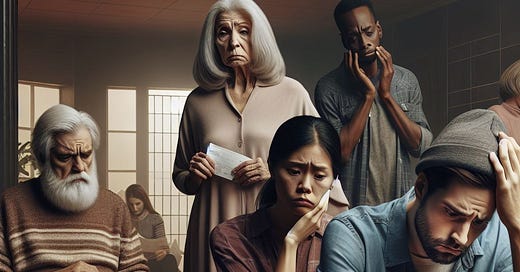Why It Sucks When Your Neighbor Wins the Lottery
Practical Lessons on Money, Happiness, and Friendship
Welcome to Provoked - a one-stop source for insights on Purpose, Happiness, Friendship, Romance, Narcissism, Creativity, Curiosity, and Mental Fortitude! Support the mission (here) and get these benefits:
A guy from my high school won the lottery. He wasn’t even old enough to buy a beer. One day, he was bumming rides from friends; the next, he unlocked a cheat code for life.
And then? Well… things got interesting.
Everyone thinks they know what happens when someone wins the lottery. You’ve probably heard that stat about how lottery winners and paraplegics are equally happy a year later (link). Yeah, about that—it’s mostly nonsense.
The study everyone loves to misquote came out in 1978. Researchers interviewed 29 accident victims, 22 lottery winners, and 22 people who had neither won millions nor been violently ejected from a moving vehicle. That’s right—this sweeping conclusion about money and happiness is based on 73 people. And here’s where it gets shakier: they didn’t track anyone over time. Instead, they sat them down for a single interview and asked: How happy are you now? How happy were you before this life-changing event? How happy do you expect to be in a couple of years?
If you just won the lottery—or, say, lost the ability to walk—don’t you think that might skew how you remember your past self? And let’s be honest, if you’re quadriplegic today or sitting on a mountain of cash, you’re probably going to "reconstruct" your past happiness in a way that makes your current reality make sense.
But wait, it gets weirder. The researchers wanted to know if winning the lottery makes life more enjoyable, so they asked people to imagine how much pleasure they’d get from seven activities: talking with a friend, watching TV, eating breakfast, hearing a funny joke, getting a compliment, reading a magazine, and buying clothes. Yep, that’s how they assessed the impact of winning millions. Who would’ve guessed that watching TV and eating toast are equally thrilling whether you’re rich, poor, or missing a limb?
Maybe we shouldn’t hang our philosophy of happiness on a tiny study from the disco era (no judgment if you didn’t read the original article - link).

The better studies on lottery winners? They’re more revealing and useful. One explains why your neighbor hitting the jackpot might be the worst thing that happens to you. The other? It explains why people buy tickets even when the odds are astronomically against them.
I’ll break them both down for you.


